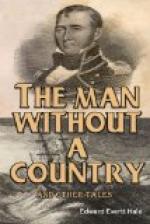“What is it, Chloe?” said I, as the old wench rushed by me with a bucket of water.
“Poor Mr. George, I ’fraid he’s dead, sah!”
And there he really was,—dear handsome, bright George Schaff,—the delight of all the nicest girls of Richmond; he lay there on Aunt Eunice’s bed on the ground floor, where they had brought him in. He was not dead,—and he did not die. He is making cotton in Texas now. But he looked mighty near it then. “The deep cut in his head” was the worst I then had ever seen, and the blow confused everything. When McGregor got round, he said it was not hopeless; but we were all turned out of the room, and with one thing and another he got the boy out of the swoon, and somehow it proved his head was not broken.
No, but poor George swears to this day it were better it had been, if it could only have been broken the right way and on the right field. For that evening we heard that everything had gone wrong in the surprise. There we had been waiting for one of those early fogs, and at last the fog had come. And Jubal Early had, that morning, pushed out every man he had, that could stand; and they lay hid for three mortal hours, within I don’t know how near the picket line at Fort Powhatan, only waiting for the shot which John Streight’s party were to fire at Wilson’s Wharf, as soon as somebody on our left centre advanced in force on the enemy’s line above Turkey Island stretching across to Nansemond. I am not in the War Department, and I forget whether he was to advance en barbette or by echelon of infantry. But he was to advance somehow, and he knew how; and when he advanced, you see, that other man lower down was to rush in, and as soon as Early heard him he was to surprise Powhatan, you see; and then, if you have understood me, Grant and Butler and the whole rig of them would have been cut off from their supplies, would have had to fight a battle for which they were not prepared, with their right made into a new left, and their old left unexpectedly advanced at an oblique angle from their centre, and would not that have been the end of them?
Well, that never happened. And the reason it never happened was, that poor George Schaff, with the last fatal order for this man whose name I forget (the same who was afterward killed the day before High Bridge), undertook to save time by cutting across behind my house, from Franklin to Green Streets. You know how much time he saved,—they waited all day for that order. George told me afterwards that the last thing he remembered was kissing his hand to Julia, who sat at her bedroom window. He said he thought she might be the last woman he ever saw this side of heaven. Just after that, it must have been,—his horse—that white Messenger colt old Williams bred—went over like a log, and poor George was pitched fifteen feet head-foremost against a stake there was in that lot. Julia saw the whole. She rushed out with all the women, and had just brought him in when I got home. And that was the reason that the great promised combination of December, 1864, never came off at all.




